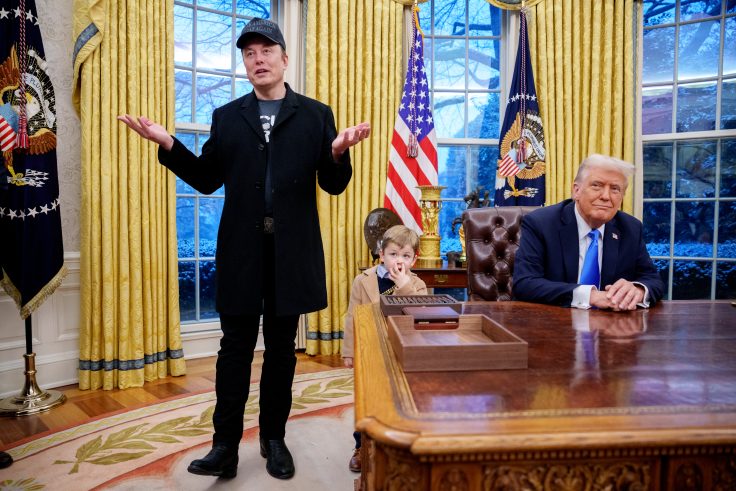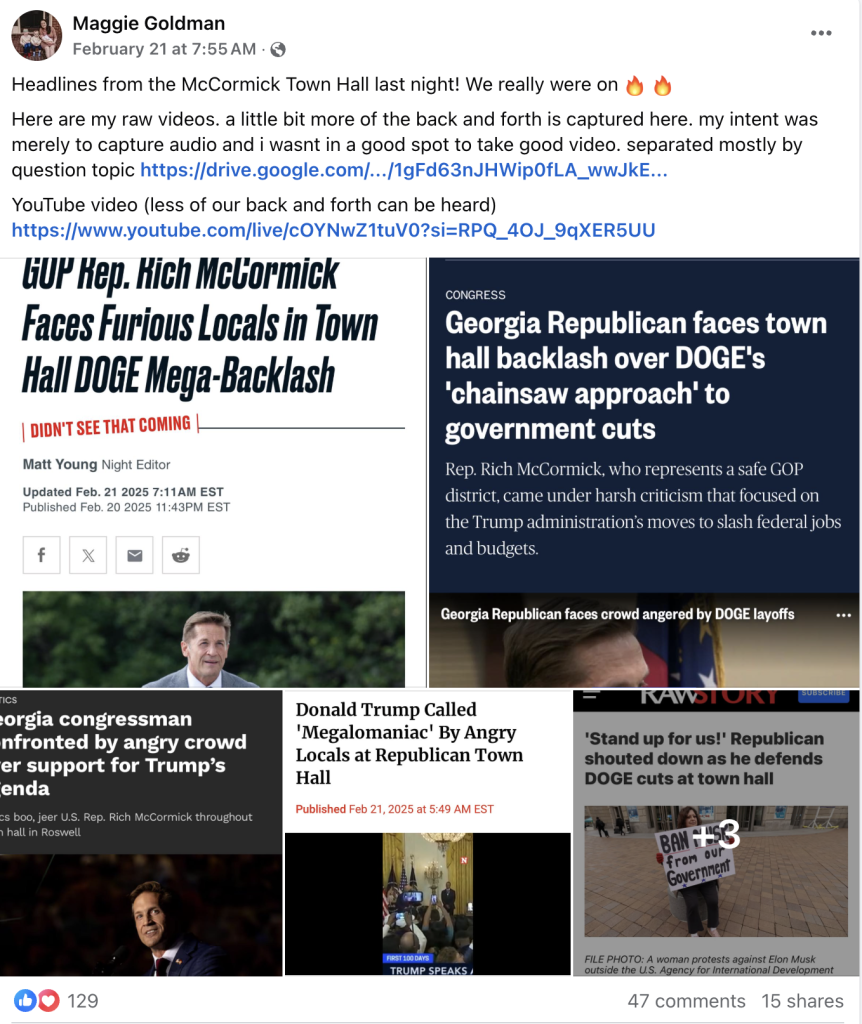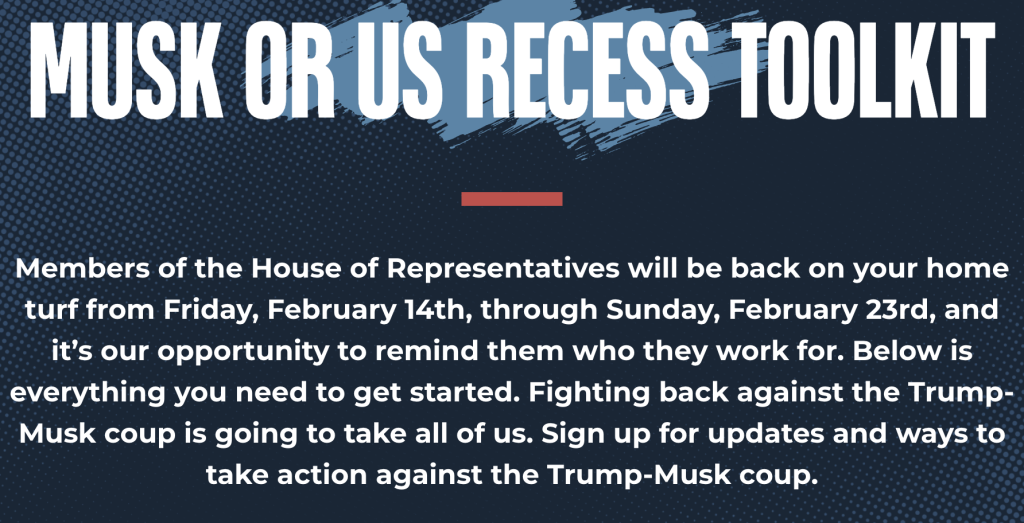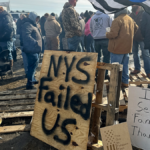Red-District DOGE Protests, Cited As Proof of Broad Musk ‘Backlash,’ Were Organized By Left-Wing Groups
In one case, a former Dem county board candidate and self-described ‘political activist’ helped organize a viral demonstration in Georgia

When angry voters confronted Rep. Rich McCormick over DOGE at a town hall held in the Georgia Republican’s deep-red district, the New York Times, Washington Post, and CBS News cited the scene as proof of emerging bipartisan “backlash” over Elon Musk’s efforts to slash government spending. CBS included a quote from one of the protest’s organizers, Maggie Goldman, describing her only as a McCormick constituent.
Goldman does live in McCormick’s district, though she’s far from a concerned supporter of the two-term Republican. A self-described “Democrat & Political Activist,” Goldman, who did not respond to a request for comment, coordinated volunteers for Pete Buttigieg’s presidential campaign in 2019 and 2020, according to her LinkedIn. Shortly thereafter, she ran for her local county commission as a Democrat seeking to enact a “more inclusive policy agenda.” Goldman has donated exclusively to Democrats and sent Kamala Harris’s campaign more than $1,500 last year, according to campaign finance records. On her Facebook page, she boasted of the national media attention the McCormick protest received, sharing screenshots of headlines alongside the caption, “We really were on 🔥🔥.”

Across the country, similar protests played out at House GOP town halls and district offices. The demonstrations drove mainstream media coverage of brewing backlash against the Trump administration as the lower chamber left Washington, D.C., for a week-long recess. Well-funded liberal organizations organized many of them.
The George Soros-funded groups Indivisible and MoveOn were at the center of the demonstrations. Both groups launched national “mobilization” efforts targeting the “Trump-Musk agenda” and “Trump-Musk coup” during the recess period. MoveOn said its “members and allies will show up at congressional-led town halls and congressional offices around the country, targeting House Republicans whose votes will be crucial in opposing Trump and Musk’s harmful policies.” Indivisible issued a “Musk or Us Recess Toolkit” that showed members how to find their local town halls and urged them to “take the fight to Elon.”

The groups’ local organizers heeded the call, launching protests against House Republicans at town halls and district offices that garnered widespread media coverage. MoveOn targeted the likes of Arizona’s David Schweikert, California’s Ken Calvert, and Virginia’s Jen Kiggans, while Indivisible organized protests against Michigan’s Tom Barrett and Wisconsin’s Bryan Steil and Scott Fitzgerald, among others.
Local outlets mentioned Indivisible’s role in the protests when covering them. Urban Milwaukee, for example, wrote that Fitzgerald’s town hall attracted “about 100 people, largely organized by an organization called Indivisible, mostly members of the Washington/Ozaukee County Democratic Party.”
The New York Times and CBS also mentioned the Fitzgerald town hall, though neither included Indivisible’s involvement.
The Times, after noting that Fitzgerald “was asked to defend the administration’s budget proposals as voters demanded to know whether cuts to essential services were coming,” acknowledged that “many of the most vocal complaints came from participants who identified themselves as Democrats.” The outlet did not disclose that those participants had professional organizing help.
CBS, meanwhile, said Fitzgerald “faced pushback on the task force and calls for Congress to subpoena Musk to testify.” It cited a “local news outlet” that “also reported that the Washington County Democratic Party had encouraged people to show up to the meeting with Fitzgerald with signs” but omitted Indivisible. So did the Washington Post, which covered the McCormick town hall and others by noting 14 paragraphs into a piece titled, “Back in their districts, GOP lawmakers get an earful on DOGE and Musk” that “liberal groups encouraged their members to show up to town halls in deep-red territory.” The Post did not give any examples of those groups.
The outlets had plenty of warning that deep-pocketed left-wing groups were organizing the demonstrations. Beyond their public press releases and toolkits, the Associated Press reported on Indivisible and MoveOn’s plans to host rallies “outside town halls and congressional offices” in a piece titled, “The anti-Musk protest movement is expected to ramp up with Congress on recess.” The AP published the piece on Feb. 17, days before the Times, Post, and CBS ran their pieces on the protests. None of the three outlets responded to requests for comment.
Indivisible has a long history of organizing town hall protests—and enjoys an expansive budget while doing so.
The group used to maintain a “comprehensive list of all upcoming town halls” but did away with it in 2023, arguing that its local chapters are usually aware of event schedules in their area before the national group. It does, however, keep an up-to-date event list and provides members with instructions on how to find town halls to add to it. Soros’s Open Society Foundations has funneled more than $7.6 million to Indivisible since 2017. It’s given MoveOn nearly $2.5 million since 2016.
Indivisible’s co-founder, Ezra Levin, teased the recess demonstrations by calling Musk a “major weak link” in the Trump administration. “I can’t think of something that polls worse than the richest man in the world is coming after your Social Security check or your Meals on Wheels or your Head Start,” he told the AP.
In some swing districts, focus group findings contradict that assessment. An Axios focus group that featured swing voters in Arizona—where Schweikert faced a MoveOn-backed protest—found that 8 of the 11 participants approved of “Musk’s efforts in the administration.”
“Several expressed views that ‘waste, fraud and abuse’ are so prevalent that government agencies can be slashed or eliminated without hurting services on which they depend,” the outlet reported.
For their part, Indivisible and MoveOn have both backed unpopular far-left policies. Indivisible called it “critical to defund the police and reinvest in community services that keep everybody safe” following George Floyd’s death in 2020. Two years earlier, its political director called to “get rid of” Immigration and Customs Enforcement and “reimagine it and build something that actually works.” MoveOn has taken similar positions, calling to release all illegal immigrants from federal detention centers during the COVID-19 pandemic.
Neither Indivisible nor MoveOn responded to requests for comment.
Jessica Costescu contributed to this report.




